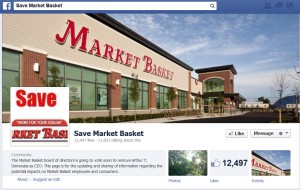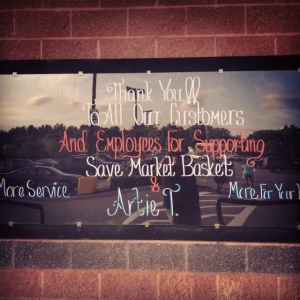On With His Head! Employee Action Saves the CEO
July 25, 2013 Leave a comment
If you live outside of New England, you’ve probably never heard of Market Basket. But last week, something amazing happened in this family-owned regional supermarket chain with stores throughout Massachusetts and New Hampshire. In a way, they had a reverse “Arab Spring”, okay, well maybe not that significant, but you get what I mean – employees used social media to band together, engage their customers and communities, and save their CEO from the corporate guillotine.
After employees got word that several board members were proposing the ouster of CEO, Arthur T. Demoulas, they took to social media in outrage at the thought. They started an online petition which has reached almost 45,000 signatures, the Twitter hashtag #SaveArthurT, and a Facebook page that has grown to nearly 12,500 likes. They used Facebook to organize rallies at stores throughout the region and they’ve attracted significant attention from the media and support from politicians, like US Rep Niki Tsongas (D-MA). For now anyway, their approach seems to have worked. The board has made no further moves to remove Demoulas from his position.
What is it that caused employees to raise their pricing guns and dust mops in protest? Was it a deep love for the CEO who grew up in this business? Was it fear of losing their jobs? Was it the ugly gray and maroon deli smocks? No! It was a business decision.
You see, while competitors focused on replacing staff with self-checkouts, tracking purchases through key-chain cards, and raising prices, Market Basket has been experiencing unprecedented growth by building new stores, keeping customer costs low, and focusing on customer service. Taken aback that the board would even consider removing Demoulas, after so much success under his leadership, employees stood up against a potential business decision that they believe will take the company in the wrong direction, resulting in higher costs for consumers.
As an HR guy, these are my favorite takeaways from this story:
- Talk about engagement! One of the most surprising parts of this story is the extent to which these employees went to have their voices heard within this company.
- Employees instinctively want what’s best for the business! The actions taken by Market Basket’s employees were fueled by their beliefs about how to operate the business and satisfy their customers, not how much they stood to personally gain.
- Social media strikes again! Once again, social media demonstrates that you can’t keep it out of the workplace. Resistance is futile!
What would you do if your employees took this approach to raising opposition to a change in your organization?


